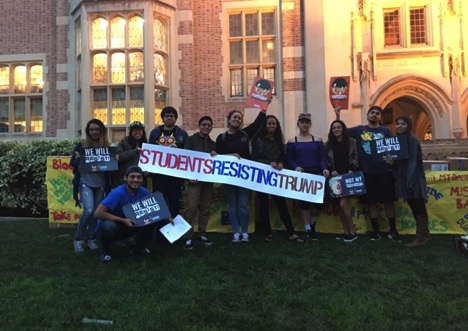Imagine you are sitting in your 9th grade biology classroom. Your teacher has just finished lecturing on pedigree mapping. She hands you a worksheet, but you are confused and unsure of how to begin. You start to raise your hand, determined to understand this strange new concept. Suddenly, the door opens; a team of five staff members enters the classroom.
“EVERYBODY HANDS UP, this is a random search!” A man asks the teacher for a class roster and begins to call out every third student on the list. A single thought recurs through your head: I have done nothing wrong. I have nothing to hide. I have done noth-… Your name has been called. You gather your belongings−fully aware that a staff member is watching you attentively−and you exit the classroom.
Let us acknowledge what has happened here. Your status has abruptly changed from that of a student to a suspect.
Unfortunately, the person in whose shoes you have been asked to place yourself is no longer a rare, unique individual. With alarming frequency, random search practices criminalize students, often for behaviors as innocuous as carrying a plastic butter-knife to school in a backpack. This shift toward excessive policing in public schools is especially traumatic for students of color, who already face explicit criminalization in the aftermath of Mr. Trump’s election to the presidency.
During his initial campaign rally Trump, claimed that undocumented people were, “ … bringing drugs. They’re bringing crime. They’re rapists.” (Washington Post). The repercussions of his words have escalated into societal outcry as students of color face increasingly overt racism in schools. CNN reported on a video which depicted several white students enrolled at Royal Oak Middle School in Michigan‒where 20% of the students are minorities‒chanting “Build a wall!” shortly after the U.S. Presidential election. While not all Latinos are undocumented, Trump’s reckless dialogue has negatively affected the safety and well-being of students of color in the United States. Trump didn’t ignite racial tensions in schools, however he did publicly attempt to normalize a narrative criminalizing Latinos in the United States.
The idealistic vision of schools as the great equalizer for students, regardless of race, is jeopardized when students are not treated as students in the classroom. While I do understand that random searches are meant to ensure student and staff safety, it is important to acknowledge the impact these practices have on students.
Desiree Martinez
Latest posts by Desiree Martinez (see all)
- Broken Student Loan System Gets An Overhaul - June 6, 2022
- Cellblock Scholars: The First College Behind Bars - May 25, 2022
- Sin Preparación en la Universidad; Puntajes bajos debido a la Pandemia - April 27, 2022
- Unprepared in College; Sinking Scores Due to Pandemic - April 21, 2022
- Los Estudiantes No Se Inscriben en la Escuela Para Hacer una Declaración Política, Ellos Van a Aprender - October 29, 2018

